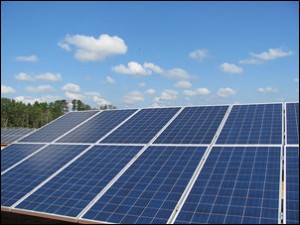Dominion Energy, an unregulated subsidiary of Dominion Resources, announced today that it will acquire a planned 80-megawatt solar facility on the Eastern Shore for an undisclosed price. The solar plant, the largest yet announced in Virginia, will supply Amazon Web Services data centers in Northern Virginia.
Dominion is purchasing the project from Community Energy, Inc., which had announced the project in conjunction with Amazon back in June. Community Energy had consolidated 44 properties into a 900-acre site near a Delmarva Power electric transmission line in Accomack County and inked the necessary agreements with Amazon, PJM Interconnection, Delmarva Power, Dominion and municipal authorities. Construction is expected to begin in 2015, and the plant is scheduled to enter service in fall 2016.
“We look forward to expanding our relationship with Amazon as it seeks to increase the mix of renewable energy on the electric grid powering its data centers,” said Thomas F. Farrell II, chairman, president and chief executive officer of Dominion. “This project also shows Dominion’s commitment to building additional clean, renewable solar facilities in Virginia.”
Through both its regulated and unregulated subsidiaries, Dominion has ramped up its commitment to solar power in the past year. Dominion Virginia Power has set a goal of building 400 megawatts of large-scale solar by 2020, and it filed with the State Corporation Commission (SCC) in October for approval of three separate projects in Powhatan, Louisa and Isle of Wight counties totaling 56 megawatts. Shortly thereafter, the SCC rejected a previously filed proposal to build a 20-megawatt solar facility near its Remington gas-fired power plant. The commission ruled that Dominion needed to seek third-party market alternatives before building its own facility.
Dominion also purchased in October a 25-megawatt facility under development in North Carolina by Invenergy, Inc., a Chicago company. That facility will supply electricity to the Naval Station of Norfolk, advancing the Department of Navy’s goal of bringing 1 gigawatts of solar electricity into procurement. Moving in a parallel track, Dominion has built a significant solar portfolio in six other states across the country.
Bacon’s bottom line: While Dominion may not be moving quickly enough to satisfy some of its environmental critics, the company clearly is upping its commitment to solar energy. I expect the pace to pick up. As a regulated utility, Dominion Virginia Power in particular has a conservative corporate culture that puts the reliability of the electric system at the top of its list of priorities. The company is determined to move cautiously, adding solar in incremental steps and building experience not only in how to develop and operate solar facilities but in how to integrate the fluctuating energy production into the electric grid.
What I can’t get a handle on is the economics of solar. Yes, yes, as a broad generality, the cost of solar is declining steadily, and one day could be the most economical form of energy on the grid. But how economical is it in Virginia now? What are the trade-offs between high up-front capital costs and zero fuel costs? I just can’t get the numbers. Everyone seems bound by non-disclosure agreements, and no one is releasing the numbers. I’ll write more about that shortly.



